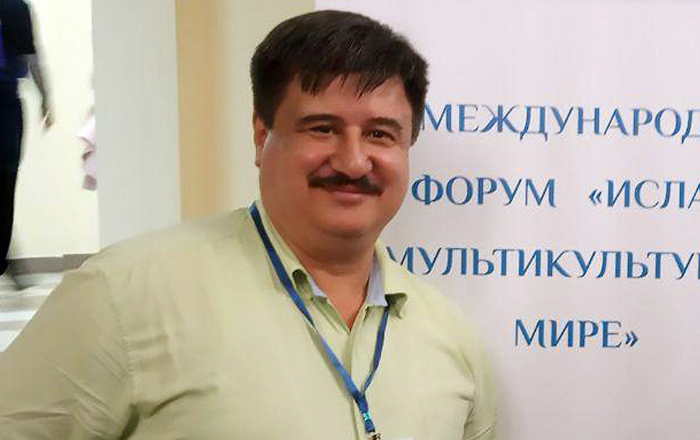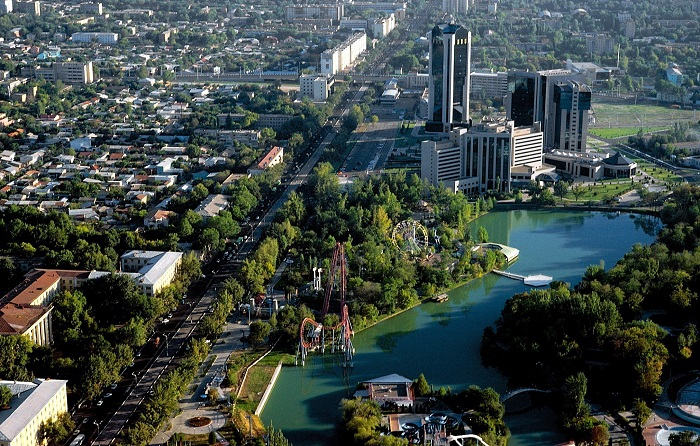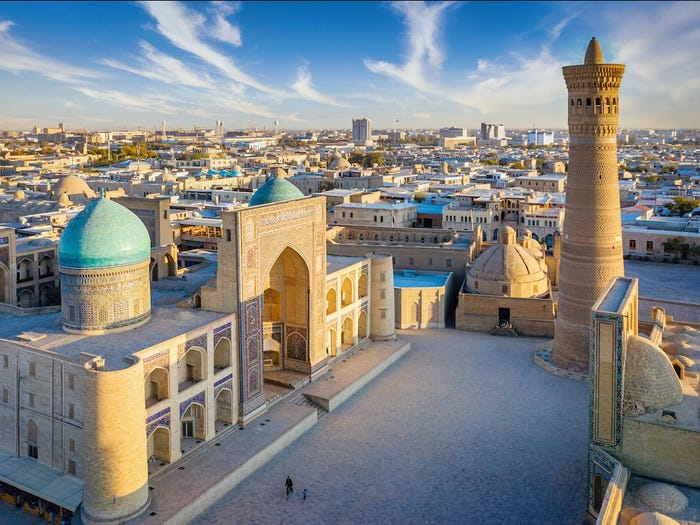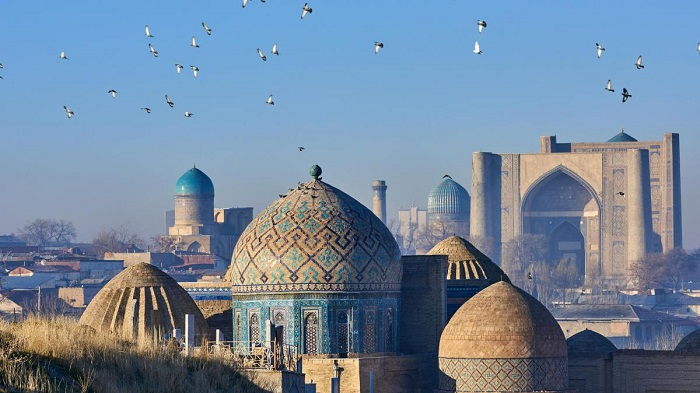The Taliban's return to power in Afghanistan has created a completely new situation in Central Asia and the Eurasian continent. On the other hand, Azerbaijan’s liberation of its territories and the full restoration of the state border with Iran, the Second Karabakh War also formed a new political and economic reality in the region. In this situation, new horizons and prospects for cooperation are opening in the geography starting from Turkey to China.
Senior lecturer of the Branch of the Plekhanov Russian University of Economics in Tashkent Ravshan Nazarov spoke about the issue in his interview to AzVision.az.
- Taking into account the new situation, which role can Uzbekistan have in the context of cooperation with Azerbaijan, Afghanistan, and Pakistan? How does the official Tashkent plan to build ties with these countries in the background of the new events in the region?
- The prospective cooperation area for the mentioned countries is the field of transport. Taking into account the fact that most countries face negative results because of the pandemic, it must be clear that the above-mentioned countries are in the system of the international transport corridors. The development of the transport connections implies a big economic benefit to our countries. The events that occurred in the South Caucasus last year, as well as the change of power in Afghanistan, created new opportunities for all countries - Turkey, Pakistan, Azerbaijan, Afghanistan, and Uzbekistan.

Until the Taliban’s return to power, the Lapis Lazuli corridor (transit project among Afghanistan, Turkey, Turkmenistan, Azerbaijan, and Georgia) was operating. Indeed, Uzbekistan was not included in this project. However, the operation of this corridor was halted following Taliban’s return to power and the future fate of the corridor is unknown. In my view, the operation of the Zangezur corridor may connect the Turkish-speaking countries and contribute to the development of economic trade relations of Central Asian countries.
Besides, our countries may think about the launch of the new transport corridor with access to the Black Sea and Europe. The unstable situation in Afghanistan is the only obstacle. Taliban has promised to implement the international obligations. These are: establishing the government based on the large representation; complying with the basic human rights and freedoms, including women and minorities; fighting against the international terror and illegal drug trade; preventing the settlement of the various terrorist groups in the country and ceasing any ties with them; maintaining the friendly relations with countries in the region.
Taliban tries to establish stable relations with other neighbours. At least, they say so. However, each country in Central Asia has concerns regarding the Taliban, since the Taliban’s next steps in the region are unknown. Faithfully, Uzbekistan pursues a policy of friendship based on mutual respect, equality, and consideration for each other's interests. Uzbekistan has agreed to continue the assistance in the management of the school and university teachers, medical workers, communications and construction networks in Afghanistan, development of railway and aircraft maintenance engineers.
The further development of cultural and humanitarian relations with Afghanistan is also of importance for Uzbekistan. The Taliban government said that they are ready to restore the experience of sending students to study Uzbek language and literature, railway, civil aviation, customs, and banking at the education centre in Termez. Besides, the new government of Afghanistan has expressed its readiness to renovate the tombs of historical personalities such as Alisher Navaji in Herat, Zahirdin Mohammad Babur in Kabul, Boborahim Mashrab in Tahar, and Abu Reyhan Biruni in Ghazni.
Joint activities are being implemented to strengthen the role of the Uzbek language in Afghanistan. Special importance will be paid to learning of the Uzbek language at schools and higher education institutions. Until today, nearly 200 Afghan students have received education in Uzbek philology in Termez.
Uzbekistan has always been interested in Afghanistan and learned its philology, literature, history, culture, economy and politics. For many years Pashto and Dari languages have been taught at Tashkent State University of Oriental Studies to prepare specialists for Afghanistan and talented translators, prominent diplomats, and professionals specified in Afghan studies have been prepared. Uzbekistan is confident that a stable, peaceful and prosperous Afghanistan responds to the interests of the multinational Afghan people and its neighbours in the region and the world community as a whole.
- What about the relations with Pakistan?
When it comes to the relations between Pakistan and Uzbekistan, bilateral trade turnover has increased by 2.5 times since the beginning of the year and more than 30 joint enterprises have been established. The air transport between Tashkent and Lahor has been restored. The importance of joint work in the future to create favourable conditions for the expansion of effective working relations was also underlined. The discussion is mainly about the implementation of the provisions of early adoption of the agreement on transit and trade agreement, the implementation of investment projects in various sectors of the economy in accordance with the adopted ‘road map’. During the meeting, the sides exchanged views on the situation in the region, considering the context of the difficult situation in Afghanistan. Moreover, an agreement was reached on the continuation of close cooperation in the provision of regional security.

Tashkent and Islamabad paid special attention to the promotion of agricultural machinery, pharmaceutical and chemicals, textile, construction materials industry, and investment projects in other areas.
- Uzbekistan actively uses opportunities of the Baku-Tbilisi-Kars railway. Trade with Turkey is especially active. What can you say about the statistics of the cargo transportation on this railway? What does the official Tashkent plan to do regarding this project?
- Baku-Tbilisi-Kars railway is of utmost importance in terms of business and mutual effective cooperation. I am sure that Azerbaijan, Georgia, and Turkey, which contribute most to the regional development will always be together and support each other. Big projects such as the Baku-Tbilisi-Kars railway further strengthen our unity and friendship. This railway is not only significant for the South Caucasus, but also the Central Asian countries. Kazakh and Uzbek Prime Ministers’ participation in the opening ceremony confirms it. A year after the opening, the Uzbek ambassador to Azerbaijan said: “We hope that Azerbaijan is interested in the potential of Uzbekistan, which is located at the heart of Central Asia with big economic and strategic opportunities. In this regard, I would like to note that the “Navai” free economic zone also creates a good ground for expanding cooperation in the field of transport and communication.” The projected capacity of the BTK is 1 million passengers and 6.5 million tons per year. In the future, the capacity of the transport corridor can reach 3 million passengers and 20 million tons per year.
In the first half of 2021, 13,610 conventional containers were delivered to the destination stations via BTK. According to the data, this rate is 63% more than the same period of 2020. Especially significant growth was observed in June-July 2021: In July 2021, the number of containers transported compared to the same period in 2020 increased 2.1 times.
In January-July of 2021, 92% of the transported containers was transit cargo. Cargo transit from the territory of Azerbaijan via BTK is transported through Turkish-Chinese, Turkish-Central Asian routes (including Uzbekistan) and opposite directions.
- Some countries claim that Turkey creates Turkic unity to pressurise the US, China, and Russia. How does Uzbekistan react to Turkey’s influence on Central Asian countries? What does Turkey want in Central Asia, in your opinion?
- Following the next stage of the Karabakh war, which was successful for Azerbaijan, new geoeconomic realities have been created for Turkey in the South Caucasus. These opportunities will allow Turkey to access Central Asia through the Caspian sea. Therefore, the Turkish business tries to get the maximum benefit out of this situation by going into the Central Asian market. The activities of Turkish diplomacy have been intensified in connection with Kazakhstan, Uzbekistan, and Turkmenistan.
Uzbekistan has ratified the military cooperation agreement with Turkey. Tashkent will cooperate with Turkey in most important issues, as well as in the field of military training and education, defense industry, surveillance activities and others.

Recently, Turkey makes loud statements:
- They call on the establishment of the single army of the Turkic speaking countries;
They put forward a proposal of creating the union in EU format;
They invite their brothers to build a ‘Turkic world’ that must be called ‘Turan’ according to neo-Turkic ideologues.
- What interests does Turkey have in Uzbekistan? What is the annual turnover?
The amount of the foreign trade turnover between Uzbekistan and Turkey was $ 2,1 billion in 2020. Uzbekistan's exports to Turkey exceeded $ 1 billion, while imports from Turkey exceeded $ 1.1 billion. Uzbekistan exported non-ferrous metals worth $ 591.2 million, textiles worth $ 206.1 million, and chemicals worth $ 78.3 million. Besides, Turkey’s import was $ 506.9 million worth of machinery and equipment, $ 291.5 million worth of chemicals and $ 45 million worth of ferrous metals.
Despite the coronavirus pandemic, the trade turnover between Turkey, and Uzbekistan increased by 93 % and reached $ 1,5 billion in the first half of 2021. By keeping this tendency, our countries aim to raise the trade turnover to $ 5 billion in 2023.
The Turkish companies, which brought the Turkish experience to Uzbekistan in strategic areas such as construction, energy, and mining industry, have gained significant successes within a short period of time. It once again proves that it is possible to achieve many successes in the future by maintaining the spirit of cooperation.

The total investment of Turkish companies in the Uzbek business amounted to nearly $ 1 billion. Turkey continues to maintain its place among the top five trade partners of Uzbekistan. The number of Turkish companies in Uzbekistan is close to 2000.
Turkish companies are among the top three foreign companies in Uzbekistan. In 2020 and the first half of 2021, the Turkish companies were leading among the new companies with foreign capital in Uzbekistan. We are proud of these successes. The most influential projects in Uzbekistan are being held with the participation of Turkish companies. The variety of the export and import products is expanding. Turkish entrepreneurs have confirmed themselves in Uzbekistan as reliable, disciplined, and healthy partners who complete all projects on time. Turkey and Uzbekistan may raise trade turnover to more than $ 5 billion.
- Which economic trends occur and will occur in the Central Asian region after the Taliban’s return to power, in your opinion?
- Today, Uzbekistan supports the consistent implementation of large-scale trade, transport and energy projects of regional significance together with Afghanistan. Uzbekistan and Afghanistan have been conducting systematic political dialogue at all levels since 2016 and this dialogue has not ceased during the most difficult times. The Taliban government has affirmed its commitment to the development of trade-economic relations and the implementation of the joint energy and transport-communication and other infrastructure projects. Uzbekistan calls for the prevention of isolation of Afghanistan and the strengthening of humanitarian aid. Uzbekistan has opened its border with Afghanistan for the provision of necessary food and industrial goods, oil products, and continues to provide uninterrupted electricity.
Uzbekistan makes efforts to turn Termez into the international humanitarian centre for ensuring easy flow of international aid to the Afghan people. Uzbekistan believes that the humanitarian aid to Afghanistan will not only resolve the problems that have accumulated over decades. For this, it is necessary ‘to freeze’ the assets and promote the implementation of large-scale infrastructure projects in Afghanistan through international financial institutes. In its politics, Uzbekistan prefers to involve Afghanistan in world economic ties through the countries of Central Asia.

Uzbekistan negotiates with Afghanistan on the restoration of mutual relations, perspectives of implementation of large-scale infrastructure projects, construction of ‘Surkhan-Puri-Khumri’ electric power transmission line with participation of international partners and ‘Termez-Mazari-Sharif-Kabul-Pishawar’ railway. The World Bank, the Islamic Development Bank, the Asian Development Bank, some countries of the Persian Gulf and Pakistan have expressed their readiness to support the implementation of the Trans-Afghan railway project.
By the way, the working meeting between the representatives of Uzbek and Afghan border bodies was held on September 27, 2021, under the leadership of the governor of Balkh province and the ruler of the Surkhandarya province. The meeting was held at the initiative of the Afghan side in order to resolve the issues of the transit of imported goods. These are the most essential goods - food, medicine, medical supply, clothes, fuel and lubricants. Taking into account the difficult humanitarian situation in Afghanistan, the agreement has been reached to discuss the problems related to cargo transit and delivery and take measures to address the problems.
One of the notable events was the Uzbek-Afghan negotiations on the development of trade-economic ties, which was held on October 16, 2021 in Termez. The establishment of mobile groups on trade, transport, railways, social issues, border security, and other areas of mutual interest is planned. It must be noted that meetings are being held at a business level and the accumulated problems can be resolved partially.
More about:
















































